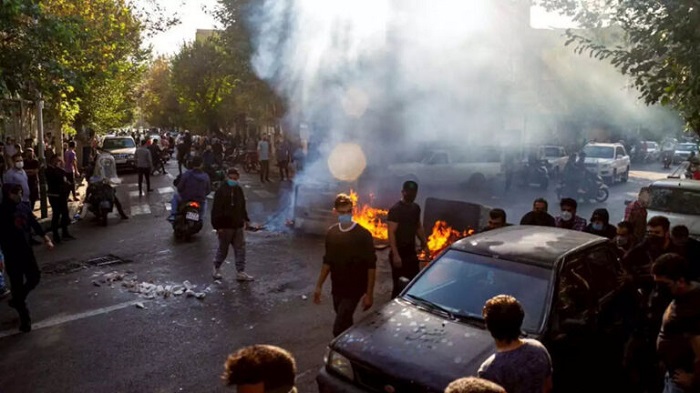

Workers who have not received paychecks for months and retirees who are demanding their overdue pensions are among those taking to the streets. The demonstrations have expanded to at least 282 cities and have been ongoing for 160 days. According to sources from the Iranian opposition People’s Mojahedin of Iran (PMOI/MEK), over 750 people have been killed, and more than 30,000 have been arrested by the regime’s forces.
On Wednesday, locals in Tehran’s Grand Bazaar and Aladdin shopping complex rallied against the regime’s economic policies, while homeowners in the 21st district protested outside the local municipal.
Landowners from the Punak district gathered outside the Presidential office, demanding answers from authorities on why they are being denied construction permits on their lands. Retirees and pensioners from the Social Security Organization also held a protest rally in Ahvaz, southwest Iran, protesting low wages and pensions, insurance issues, and poor living conditions.
February 22 – Tehran, #Iran
More footage of retired teachers rallying outside the regime's Education Ministry protesting poor economic conditions.#IranProtests2023 pic.twitter.com/LDuNXvU1OM— People's Mojahedin Organization of Iran (PMOI/MEK) (@Mojahedineng) February 22, 2023
Meanwhile, store owners in Arak went on strike, protesting the country’s poor economic conditions and falling national currency. Villagers living near the city of Kashan held a gathering, protesting mining activities that are threatening their livelihood. Retired teachers in Tehran and Shiraz rallied outside the Education Ministry, protesting their poor economic conditions and calling for the release of jailed teachers.
On Tuesday night, locals in Tehran’s Narmak and Punak districts and in the city of Kermanshah chanted anti-regime slogans, specifically targeting Supreme Leader Ali Khamenei. Retirees and pensioners from the country’s medical sciences universities and other medical institutions gathered in Tehran, protesting poor economic conditions and low pensions. Store owners in Baneh went on strike, protesting the falling national currency and skyrocketing prices of basic goods. Disabled citizens rallied in Mashhad, demanding the pensions owed to them.
Municipality workers from Khuzestan Province held a protest gathering in Ahvaz, demanding clarification of their employment status. Petrochemical plant workers in Masjed Soleyman protested not receiving their paychecks and insurance pensions for the past six months. Truck drivers in Nur went on strike for a second day, protesting poor economic conditions.
Teachers in Tehran rallied outside the Education Ministry, and bakery owners in Neyshabur held a gathering, protesting the refusal of local officials to address their demands. Contract workers of the East Azerbaijan Province also held protest rallies in Tabriz.
Iranian opposition President-elect Maryam Rajavi of the National Council of Resistance of Iran (NCRI) expressed her confidence that the Iranian people would overthrow the mullahs’ regime and establish a democratic republic based on freedom and democracy.
“I am confident that this revolution will succeed because it is led by those who are willing to pay the price,” she said.
I am confident that this revolution will succeed, because it is led by those who are willing to pay the price.#IranRevolution #FreeIran pic.twitter.com/CMoeIypbR0
— Maryam Rajavi (@Maryam_Rajavi) February 21, 2023

MEK Iran (follow us on Twitter and Facebook), Maryam Rajavi’s on her site, Twitter & Facebook, NCRI (Twitter & Facebook), and People’s Mojahedin Organization of Iran – MEK IRAN – YouTub







